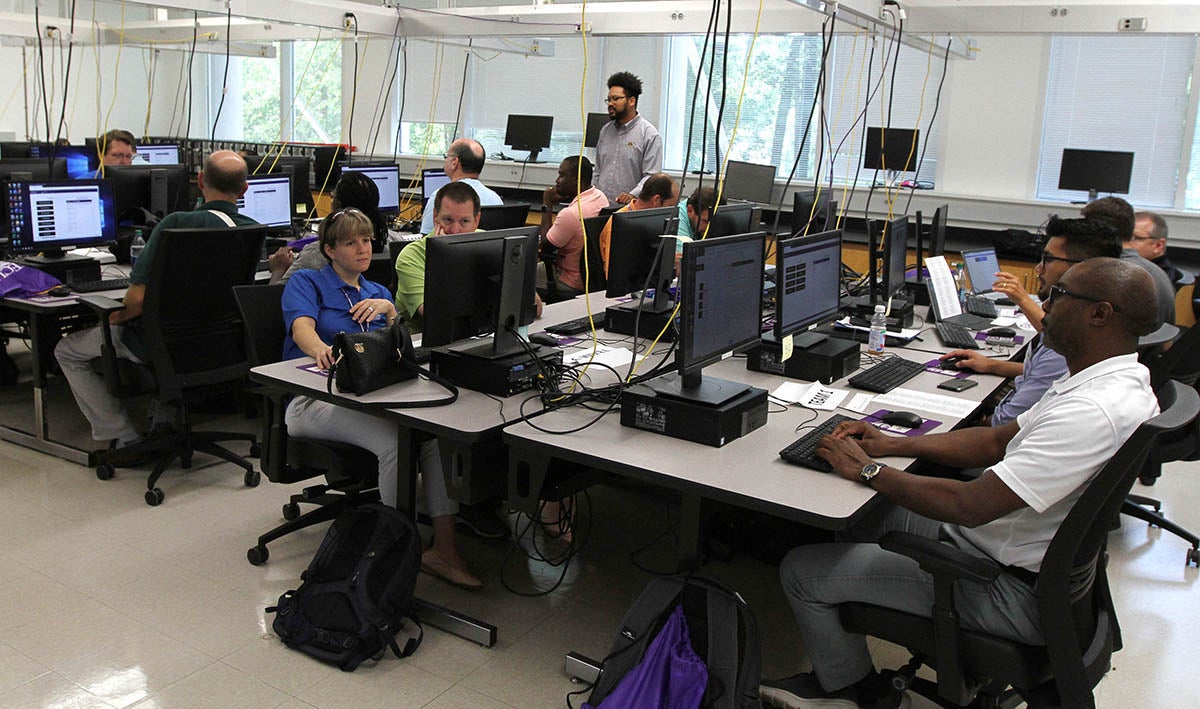ECU team develops cybersecurity game as learning tool
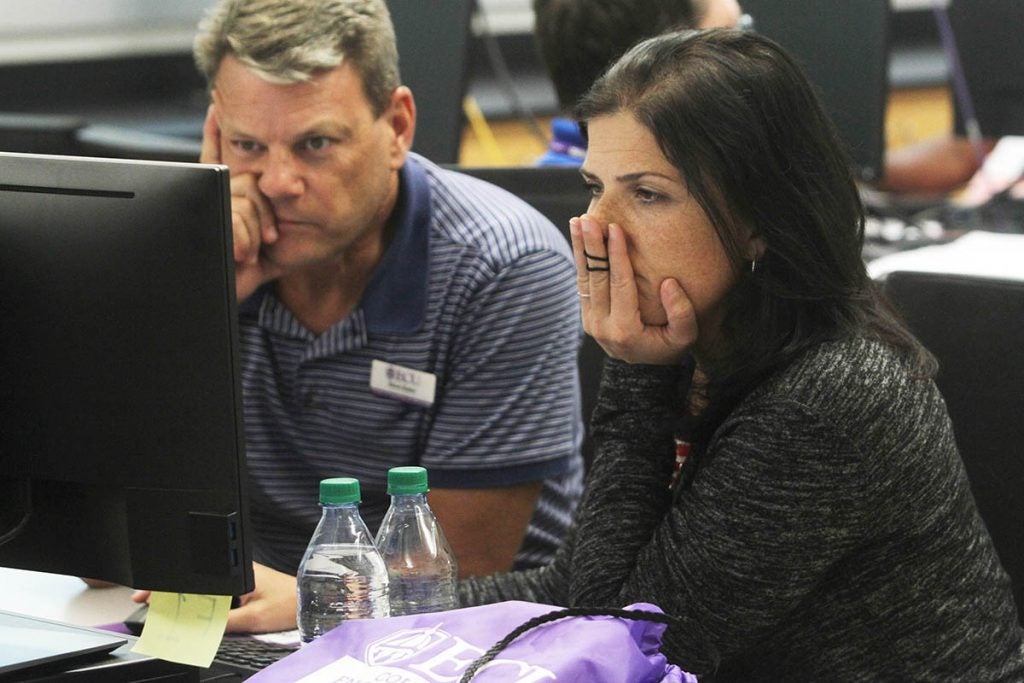
Ulku Clark, an information systems professor from the University of North Carolina Wilmington, and Steve Baker, a teaching instructor with the Department of Technology Systems at East Carolina University, team up during a cybersecurity workshop Wednesday at ECU.
(Photos by Ken Buday)
About 20 computer teaching instructors participated in a high-stakes game of cybersecurity during a Competitive Labs-as-a-Service (CLaaS) workshop Wednesday and Thursday in the College of Engineering and Technology at East Carolina University.
The workshop introduced a game developed by a team of ECU professors and students that is designed to provide participants a realistic computer network to defend against cyberattacks, while also allowing them to launch attacks against each other. The participants earn points for successfully defending an attack but lose points if they fail.
Though it’s a game, real learning takes place.
“They will get points or they will lose points, but it’s all about cybersecurity,” said Dr. Te-Shun Chou, professor in the Department of Technology Systems who served as the facilitator of the workshop.
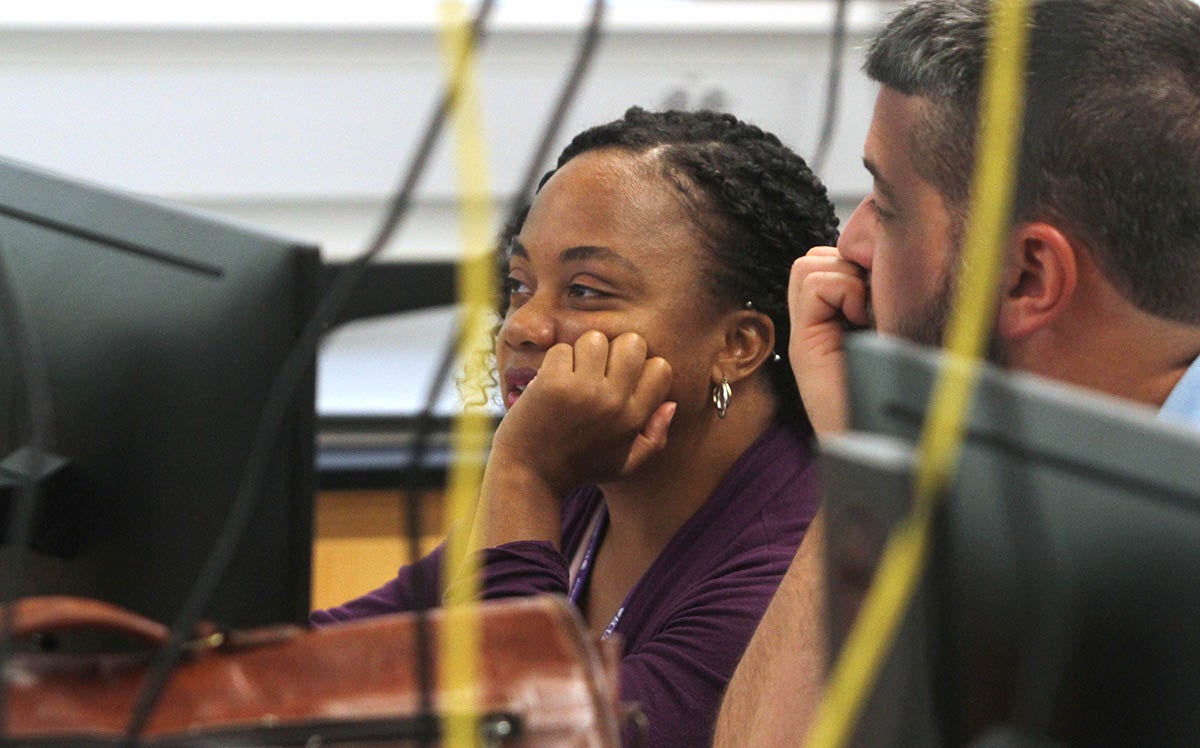
Penny Blue, a networking and security systems instructor at Coastal Carolina Community College in Jacksonville, works with Brian Miller, an ECU technology systems teaching instructor, during a cybersecurity workshop Wednesday at ECU.
Chou led a team that received a $299,745 grant from the National Science Foundation in 2017 to develop the game that is designed to provide cybersecurity awareness education for ECU undergraduate students as well as community college students. The game is designed to help users think critically and solve problems in real time.
Chou said the goal of the game is for students to not only understand how to defend against cyberattacks, but also to understand the behavior of attackers, which can help them employ a defense strategy.
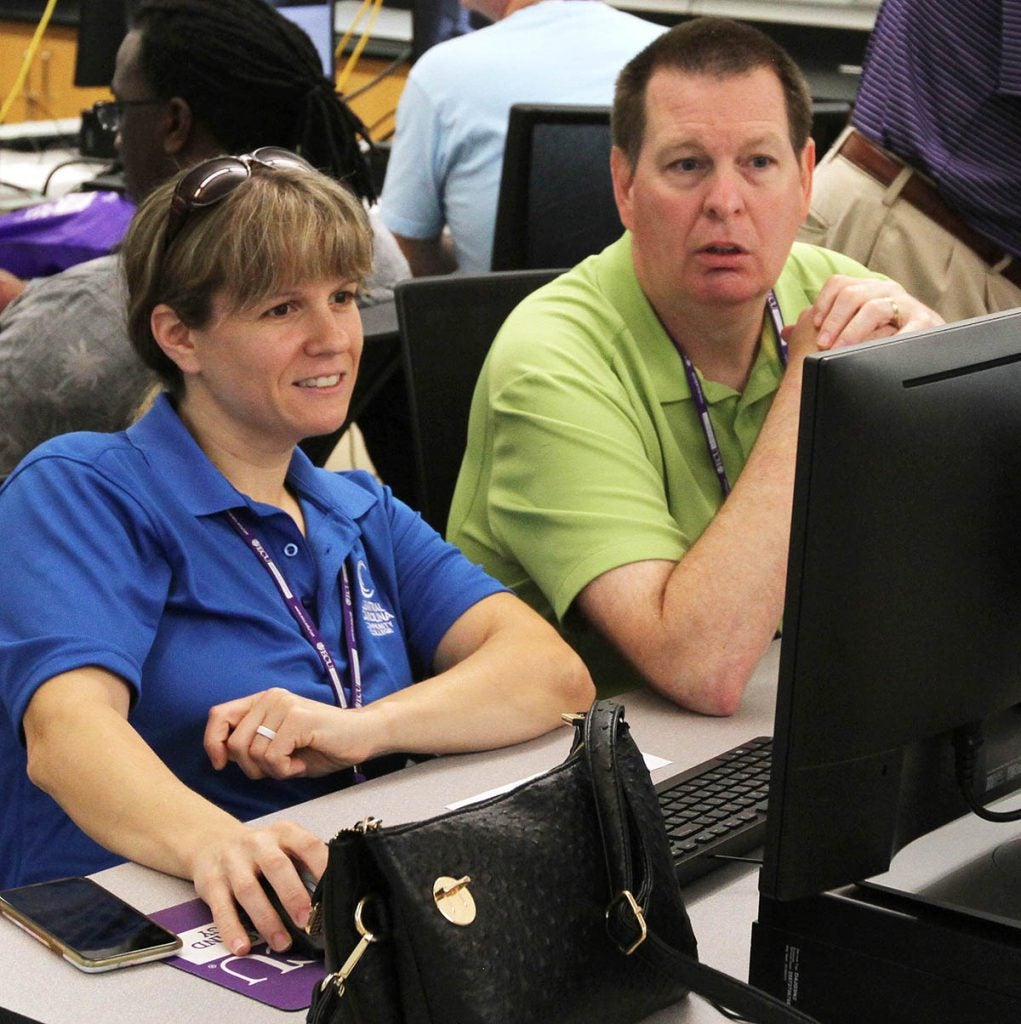
Constance Boahn, left, chair of the Engineering and Computer Information Technologies Department at Central Carolina Community College, works with Kelly Caudle, a program chief at Stanly Community College, during a cybersecurity workshop Wednesday at ECU.
The workshop introduced the game for the first time to community college instructors from throughout the Southeast, with a special emphasis on colleges in rural and underrepresented communities in eastern North Carolina.
Chou said the workshop featured a combination of cybersecurity theory and practice, introducing fundamental concepts and skills to the participants.
Constance Boahn, chair of the Engineering and Computer Information Technologies Department at Central Carolina Community College in Sanford, said she attended the workshop to take the information she learned back to her students.
“It’s really interesting,” said Boahn, who also serves on ECU’s Department of Technology Systems Advisory Board. “We’re looking for any way to keep our students more engaged.”
The workshop also featured guest speakers such as Dale Drummond, the senior network Management Engineer at MCNC, a technology nonprofit that builds and operates broadband infrastructure for educational, nonprofit health care and other community institutions. Another featured guest was Fred Hobbs, a cybersecurity director at Hyster-Yale Group in Greenville. Various ECU staff also spoke, including Richard Fraboni and Mark Webster from Information Technology and Computing Services, and Joel Sweatte, director of information technology for the College of Engineering and Technology.
“With the advances in cybersecurity, we’ve been really looking for some type of cybersecurity range that can be used by students to test their skills and to learn new skills,” said Kelly Caudle, program head and lead instructor for the Cisco Academy Support Center and Instructor Training Center at Stanly Community College in Albemarle.
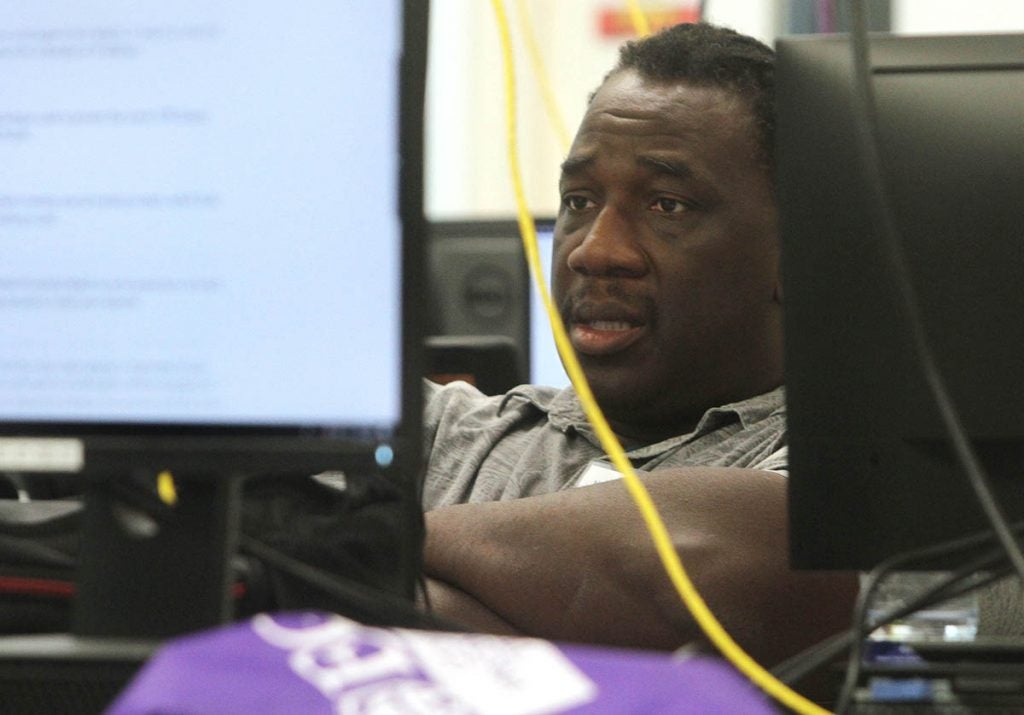
Jimmy Crum, an information security officer for the Dekalb County School District in Stone Mountain, Georgia, participates in the cybersecurity workshop.
He credited ECU for its work with community colleges in fostering cooperation among staff and faculty as well as for its acceptance of community college transfer students.
“We send every student we can here,” Caudle said. “ECU has a reputation of being a leader in technology. Anything I can do to support ECU and its support of community colleges, I’ll do. This department — and I tell every community college student I work with — really understands the need for hands-on technical skills. That’s one of the reasons I’m here. I know their faculty well, and this is a very good place for technology.”
The project team included Chou as principal investigator, along with Dr. Charles Lesko, Dr. John Pickard, Dr. Biwu Yang and Lee Toderick as co-principal investigators. John Jones served as senior investigator. The student team included graduate assistants Nicholas Hempenius and Tolulope Awojana, and undergraduate assistants Jarell Anderson, Wesley Hotalen, Matthew Copeland, Sophia Armstrong, Dylan Kerkhoff and Quinton Jones.
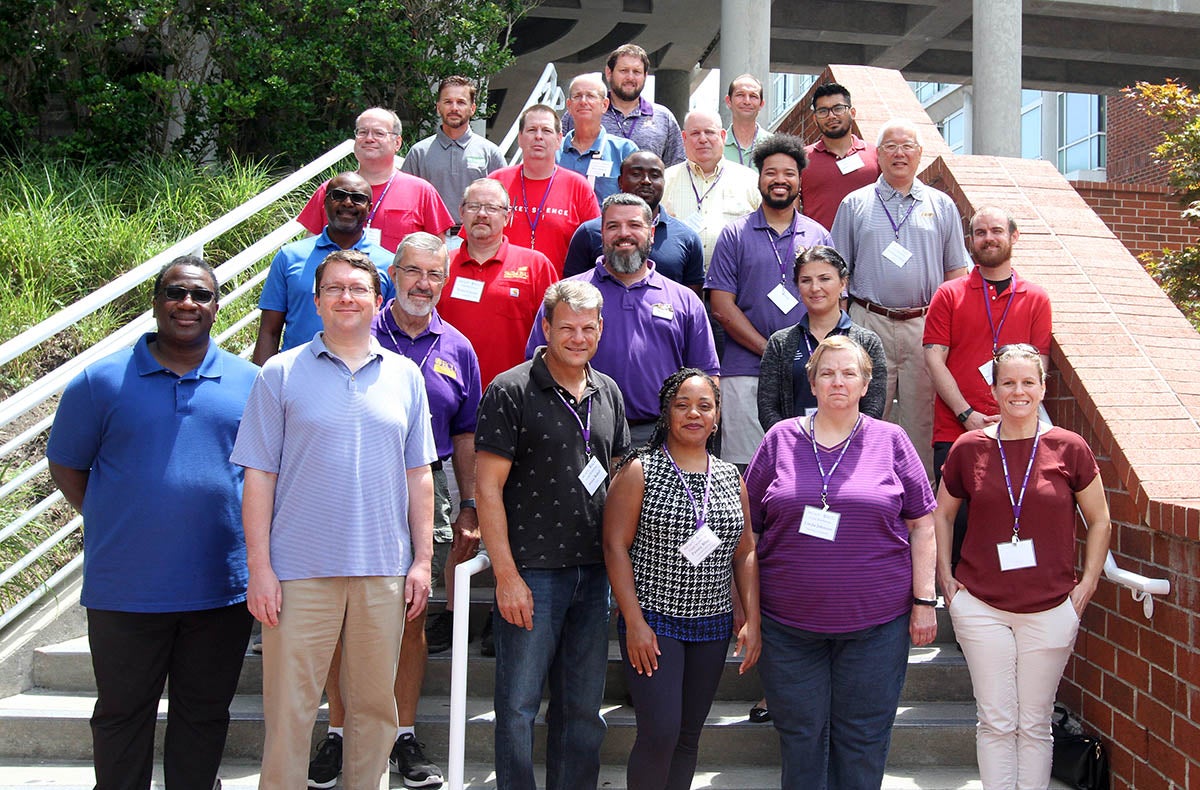
Participants in the cybersecurity Competitive Labs-as-a-Service (CLaaS) workshop pose for a picture Thursday at the College of Engineering and Technology at East Carolina University.
-by Ken Buday, University Communications
